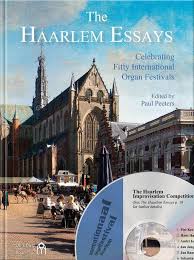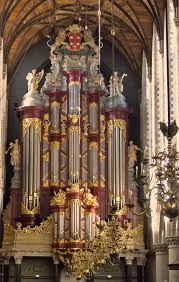Gisteravond werd de vijftigste editie van het Orgelfestival in Haarlem opgeluisterd met een concert in de Grote of St. Bavo-kerk door de organisten Ton Koopman en Olivier Latry. Ook werd het lijvige boek The Haarlem Essays gepresenteerd, waarin de Werdegang van het in 1951 opgerichte improvisatieconcours gedetailleerd uit de doeken wordt gedaan. De sfeer in de uitverkochte kerk was opperbest.
Om het – live op Radio 4 uitgezonden – concert voor de toehoorders aantrekkelijker te maken, werden de verrichtingen van de twee orgelkampioenen en hun registranten vertoond op videoschermen. Daarop zagen we hoe Ton Koopman beweeglijk en gedreven enkele werken van Johann Sebastian Bach en diens zoon Carl Philipp Emanuel onder handen – en voeten – nam. Dat hij in zijn enthousiasme wel eens een nootje miste of ritmisch in de knoop kwam vergaven we hem van harte, vanwege zijn avontuurlijke en levendige spel.  Een totaal contrast met de onstuimige Koopman vormde diens bijna twintig jaar jongere Franse collega Olivier Latry, die zijn tanden zette in composities van twee van zijn landgenoten: Litanies van Jehain Alain en L’Ascension van Olivier Messiaen.
Een totaal contrast met de onstuimige Koopman vormde diens bijna twintig jaar jongere Franse collega Olivier Latry, die zijn tanden zette in composities van twee van zijn landgenoten: Litanies van Jehain Alain en L’Ascension van Olivier Messiaen.
Latry bleek een baken van rust. Met welhaast militaire precisie vertolkte hij de ietwat jolige, volksmuziekachtige noten van Alain en wist hij ook de bezonken klanken van Messiaen te bezielen. De Fransman paart een subtiel gevoel voor klankkleur aan een uitgewogen retoriek en voerde ons in het laatste deel van L’Ascension met innig uitgesponnen klanken welhaast letterlijk naar de hemel.
Het orgelfestival werd in 1951 opgericht als een improvisatieconcours en nog altijd vormt dit onderdeel de kern van het sinds 1986 tweejaarlijkse evenement. Dit jaar tekenden 21 kandidaten uit zeven verschillende landen zich in, door middel van een opname van hun kunnen.
De inzendingen werden anoniem beoordeeld door een driekoppige jury, die acht deelnemers selecteerde: David Cassan, Jacob Lekkerkerker, Geerten Liefting, Harmen Trimp, Lukas Grimm, Luke Mayernik, Morten Ladehoff en Tobias Wittman. – Enkel jongemannen dus, dames lijken het orgelspel nog niet massaal omarmd te hebben.
In drie rondes strijden de heren om de felbegeerde prijs, aan de hand van evenzoveel speciaal voor het concours gecomponeerde thema’s. Voor het thema van de eerste ronde (afgelopen maandag 14 juli) tekende de Oostenrijkse organist/componist Hans Haselböck (zelf drievoudig winnaar in de jaren 1958 – 1960).
Het tweede thema (dinsdag 15 juli) komt voor rekening van de Nederlandse componist Roderik de Man, en voor de finale (vrijdag 18 juli) wist het Orgelfestival Louis Andriessen te strikken. Hoewel hij de zoon is van de vermaarde Haarlemse organist en componist Hendrik Andriessen, wordt dit zijn eerste orgelcompositie ooit. Zijn thema dient alleen de drie eindkandidaten tot inspiratie.

Wie de drie uitverkorenen zijn blijft tot de finale geheim, zelfs voor de juryleden. De slotrondes worden overigens beoordeeld door een fris team van vijf deskundigen – onder wie één vrouw, de Slowaakse Zuzana Ferjencíková (winnaar in 2004).
Allen bepalen zij hun oordeel anoniem: de kandidaten worden niet met naam genoemd en spelen onzichtbaar voor de jury. Ook de volgorde van spelen is beide voorrondes anders, de juryleden noemen na afloop slechts het nummer van hun favoriete kandidaat. Het blijft dus tot het einde toe een verrassing wie de finale haalt.
Hoewel? Het publiek weet a.s. vrijdag meer dan de jury, want het mag een eigen prijs uitreiken namens Flentrop Orgelbouw. Daartoe worden bij aanvang formulieren uitgedeeld met de namen van de drie finalisten en de volgorde van hun opkomst. Als voorzitter Stephen Taylor na afloop van het juryberaad bekend maakt dat nummer 1, 2 of 3 gewonnen heeft, weet hij dus niet en de toehoorders wel om wie het gaat. – Het wordt in alle opzichten een spannende finale!
Nagekomen bericht: De jury heeft bij wijze van uitzondering VIER kandidaten toegelaten tot de finale.
18-7-2014: de publieksprijs ging naar de Duitser Lukas Grimm, de prijs van het orgelconcours werd door de jury toegekend aan de Fransman David Cassan.

Het concert van Koopman en Larty is te beluisteren op http://zomeravondconcert.radio4.nl/uitzending/282512/Zomeravondconcert.html
Het MAX Avondconcert!
Reacties zijn gesloten.